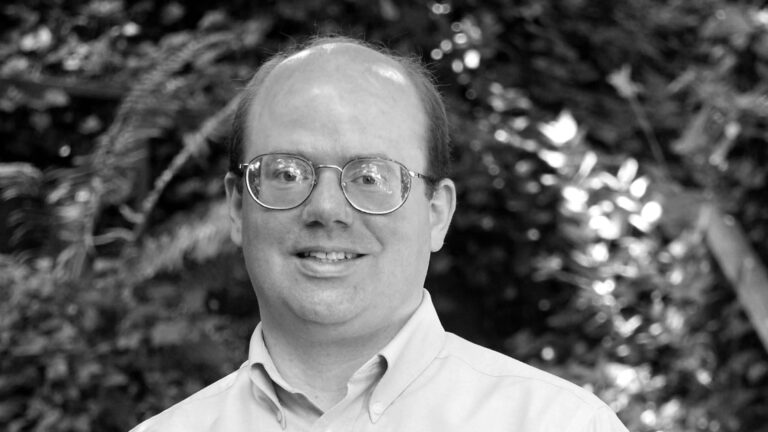When I was 10 years old my dad bought me a catcher’s mitt. I say it was for me, but it was really for him. He needed a glove to gather up the wild pitches of his Little League son. The Atlanta Braves were finally good that year, and I badly wanted to be the next John Smoltz, so every night after supper we would head out to the line of pear trees in our backyard. Smoltz to Olson. Again and again. Years later my dad would confess that the pitches were so wild that he also invested in a cup.
Michael Chabon once wrote that fatherhood is “an obligation that was more than your money, your body, or your time, a presence neither physical nor measurable by clocks: open-ended, eternal, and invisible, like the commitment of gravity to the stars.” Like the commitment of gravity to the stars. An unseen reality so foundational that, without it, everything begins to fall apart, the stars themselves slip from the sky.
That’s how life felt a year later, like stars slipping from the sky. There are a lot of ways to lose a father, each with unique pains. Death. Divorce. Abandonment. I lost mine to addiction, a living death that rivals death itself.
Addicts aren’t gone, but they’re missing. Their addiction has banished them to wander as a ghost who haunts the land of the living with the presence of their absence. From 1991 to 2000, my dad was still around, but he was gone. A ghost of his former self, haunting my Little League games with his absent presence.
Wound of Fatherlessness
The other day my wife asked a strange question: “Who taught you how to shave?” We had been talking about my dad, about what growing up without him was like. I had to think about it for a minute. “Actually, I think it was my college roommate, Rosey.” All around that conversation my dad’s absence loomed large. Not that I hadn’t been in touch with him through those years. I had. Supervised visits after rehab. Letters and an occasional phone call after prison. Strained visits as he rebuilt his life with a new family. How do you forgive your father for not being a father?
A counselor once put it to me this way: “You have to grieve the loss of your dad ever being your dad, and then you get to decide if you want a friendship with him.” Fair enough. But how do you grieve the loss of gravity? How do you put the stars back into the sky? How do you teach yourself to shave? How do you pitch Smoltz to Olson by yourself?
The wound of fatherlessness isn’t lightly healed. Time certainly is no help. If anything it reveals just how big the wound really is, just how much damage the foundation has actually suffered. My pastor growing up was fond of saying, “Time doesn’t heal all wounds. Jesus does.” I knew what he meant, but I still had no real idea. It has only recently begun to dawn on me. Time isn’t the healer of all wounds, but there is a Wounded Healer who uses it to his own ends.
Wounded Healer
For the longest time I was indifferent to Jesus. What did his suffering have to do with mine? I still remember sitting in our pastor’s office as he explained the physical dynamics of Jesus’s death on the cross in excruciating detail. He was passionate, his words compelling, but I was so unmoved. I didn’t want Jesus. I wanted Jesus to leave me alone with my albums and video games. Smashing Pumpkins’s Siamese Dream and Bill Walsh College Football would do just fine for the time being.
And then something happened. I started to feel haunted by the wounds of Jesus.
Slowly, at first. I began to see that his wounds meant something for mine, spoke to mine in their own language. My pain wasn’t foreign to him. My sins weren’t too big (or too small) for him. And, maybe most importantly of all, he knew what it was to feel abandoned by a Father. He cried out from the cross in a shout of pain, the pain of being forsaken, of being alone. And for a moment, gravity buckled, and the stars slipped from the sky in total darkness.
“By his wounds, we are healed.” That’s what the prophet Isaiah—and later the apostle Peter—wrote. His wounds are a world of healing, and they speak to ours. In my case, they are still speaking. Henri Nouwen put it best:
Jesus is God’s wounded healer: through his wounds we are healed. Jesus’s suffering and death brought joy and life. His humiliation brought glory; his rejection brought a community of love.
I will never get back the father I lost. But I have gained, through Jesus’s suffering, another Father who has fathered me well. A Father who promises never to leave or forsake his children.
I’m closing in on 38, and I’m now a father myself, to three girls and a boy. God still hasn’t magically taken away my father wound. Sometimes I wish he would. Instead, he has begun the long work of healing. It has taken time. But for the first time in years I’ve started watching the Braves again. Most nights my 11-year-old son joins me. He loves Ozzie Albies. Freddie Freeman too. I can’t wait to teach him how to shave.
“The Most Practical and Engaging Book on Christian Living Apart from the Bible”
 “If you’re going to read just one book on Christian living and how the gospel can be applied in your life, let this be your book.”—Elisa dos Santos, Amazon reviewer.
“If you’re going to read just one book on Christian living and how the gospel can be applied in your life, let this be your book.”—Elisa dos Santos, Amazon reviewer.
In this book, seasoned church planter Jeff Vanderstelt argues that you need to become “gospel fluent”—to think about your life through the truth of the gospel and rehearse it to yourself and others.
We’re delighted to offer the Gospel Fluency: Speaking the Truths of Jesus into the Everyday Stuff of Life ebook (Crossway) to you for FREE today. Click this link to get instant access to a resource that will help you apply the gospel more confidently to every area of your life.


































